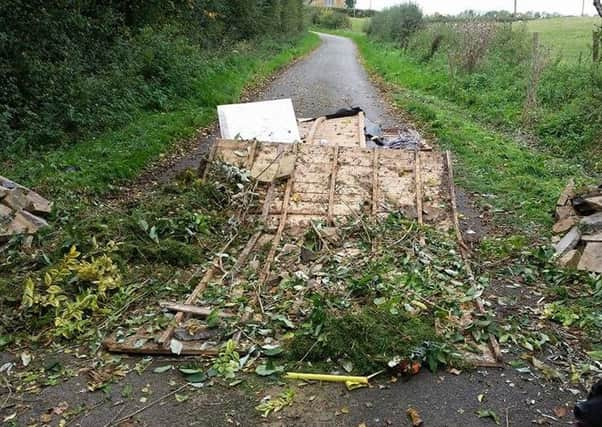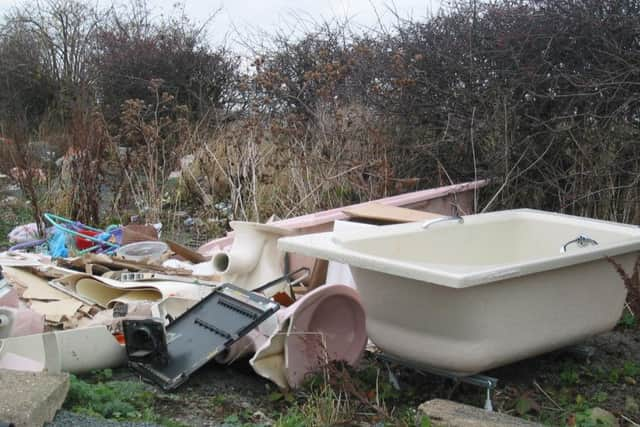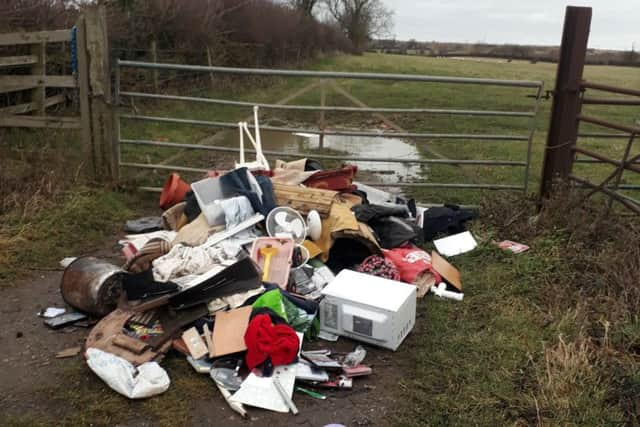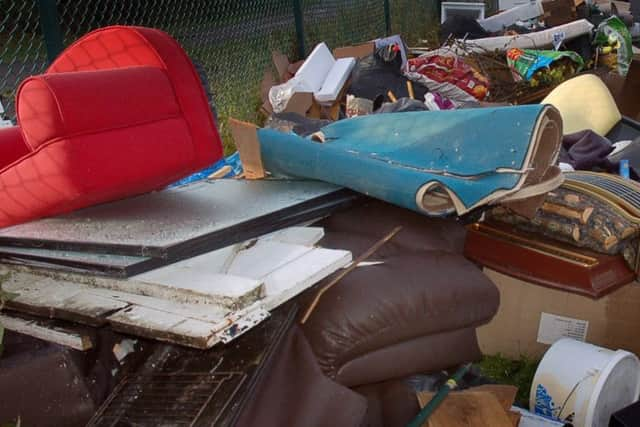Increasing fly-tipping incidents are costly for Melton taxpayers and farmers


Few weeks go by without someone posting a photograph on social media of the latest dumped waste at a remote rural location, a country lane or on farmland.
Recent spots targeted by fly-tippers were Welby Lane, Bartholomew’s Way and the Fairmead Estate.
Advertisement
Hide AdAdvertisement
Hide AdThe latest statistics, revealed by the Department for the Environment, Food and Rural Affairs (DEFRA), refer only to fly-tipping on land owned by the local authority so the damage to the environment is clearly even greater.


The problem, which saw more than one million fly-tipping incidents reported in England in the year 2016-17, will be tackled in May when Melton Council joins together with other districts to combat the issue with an information campaign advising residents how best to dispose of their waste for the good of the environment.
Amanda Hume, environmental services officer at the borough council, told the Melton Times: “What we have seen in Melton is an increase in the volume of waste that is being fly tipped, they are becoming larger with an increase in commercial waste being dumped, such as builders’ materials.
“Commercial waste is not accepted at the local tip operated by Leicestershire County Council - it has to be taken to a tip that accepts these types of materials.
Advertisement
Hide AdAdvertisement
Hide Ad“There is a charge for disposal, and this is avoided by fly-tipping.”


Ms Hume said the council was aware of certain areas the fly-tippers target.
She said: “There are well known regular fly-tipping hot spots in the borough, which are now being monitored regularly and are under surveillance.
“We also have evidence that across Leicestershire, rogue house clearance operators are fly-tipping household items that, in good faith, residents have paid for them to dispose of.
Advertisement
Hide AdAdvertisement
Hide Ad“Residents using these kind of services should ask to see the operators’ valid waste carriers licence, or check the Environment Agency public register. “Every year, thousands of householders are caught out by unlicensed waste contractors, who are not registered to take their waste away. This waste is commonly found illegally fly- tipped in our countryside.”


The government moved last week to address the issue of dishonest waste collectors who go on to dump rubbish in rural areas.
Ministers announced a consultation on fly-tipping with new measures to allow Melton Council and other local authorities to fine households which dump waste and to give the Environment Agency new powers to block access to problem waste sites.
Mrs Hume added: “Residents can help the council by reporting incidents of fly- tipping.
Advertisement
Hide AdAdvertisement
Hide Ad“We would say to them that if you have household rubbish to dispose of take it to the local tip for free, or use the council’s bulky waste collection service.”


New Defra figures show that councils in the East Midlands have spent £3 million in the last year cleaning up after fly-tippers.
They indicate there were 392 incidents of fly-tipping on council-owned land in Melton in 2016-17, up from 298 the year before.
Rutland is another district which has particularly suffered, with incidents up from 266 to 461 in the year and costing almost £20,000 to clean up.
Advertisement
Hide AdAdvertisement
Hide AdRising incidents of fly-tipping are proving particularly costly for farmers, who have to pay to remove the waste from their land.
Alison Pratt, from the regional branch of the National Farmers’ Union (NFU), said: “No figures are collected about fly-tipping on private land or farmland, but we do know that it is an increasingly difficult crime to combat, and one that is on the increase.
“We get regular reports of dumped household and commercial rubbish coming into our offices.


“The issue is that this rubbish becomes the responsibility of the farmer who has to arrange for it to be disposed of and usually has to pay for its removal.
Advertisement
Hide AdAdvertisement
Hide Ad“This obviously can be expensive, with costs sometimes in the thousands to dispose of commercial waste.”
Mrs Pratt said the impact of fly-tipping is not only financial on the lives of people who live in rural communities.
“The rubbish can also be dangerous to humans, livestock and wildlife,” she added.
“We have some gruesome photos of cattle eating rubbish – it could kill the animals or mean a large vet bill to deal with ingestion or injuries caused by broken glass, sharp metal, clinical waste or ingesting poisonous plant material.”
Advertisement
Hide AdAdvertisement
Hide AdLycetts, which specialises in farm and estate insurance, say there are increasing concerns within the farming community about the impact fly-tipping is having on their businesses.
William Nicholl, head of the company’s rural division, said: “Farmers are well aware of this issue and are saddened by the visual impact it has on the countryside they maintain, as well as it being a nuisance and inconvenience when trying to get on with their normal, daily jobs.
“However, I don’t think that farmers are as aware that, should they fail to deal with incidences of fly-tipping on their land and it leads to environmental damage, they could be held liable under the Environmental Protection Act 1990.
“With many authorities looking at introducing charges for bulky waste and organic waste collections and charging for dumping waste at council-run tips, there is a fear that fly-tipping incidents on farmland will increase.”
Advertisement
Hide AdAdvertisement
Hide AdMelton Council aims to remove fly-tipping within two working days, from the day it is reported. Priority is given to hazardous waste and large quantities of fly-tipping may take longer but is eventually removed as soon as practical.
Council advice if you find illegally dumped waste is to report:
lLocation of fly-tip
lDescription of dumped waste
lDate and time of offence
lDescription/name/address of person(s) responsible
lDescription and registration number of vehicle used in fly-tip
lDo not do anything that could put yourself in danger
lPass the information on to the council online at www.melton.gov.uk or by calling 01664 502502